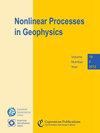条件非线性最优摄动(CNOPs)的无伴随采样算法
IF 2.4
4区 地球科学
Q3 GEOSCIENCES, MULTIDISCIPLINARY
引用次数: 1
摘要
摘要在本文中,我们提出了一种基于最先进的统计机器学习技术的采样算法,以获得不同于传统(确定性)优化方法的条件非线性最优扰动(CNOP)。1具体而言,传统方法在实践中不可用,这需要数值计算梯度(一阶信息)使得计算成本昂贵,因为它需要大量的时间来运行数值模型。然而,采样方法直接将梯度降低到目标函数值(零阶信息),这也避免了使用伴随技术,该技术不适用于许多大气和海洋模型,并且需要大量存储。我们从大数定律出发,对采样算法进行了直观的分析,并进一步提出了Chernoff型浓度不等式,以严格表征样本平均值概率接近精确梯度的程度。实验获得了两个数值模型的CNOP,即小粘度Burgers方程和Lorenz-96模型。我们展示了获得的CNOP及其空间模式、目标值、计算时间和非线性误差增长。与三种方法的性能相比,量化CNOP的所有特征几乎一致,而使用样本较少的采样方法的计算时间要短得多。换句话说,新采样算法以损失很少的精度为代价,最大限度地缩短了计算时间。本文章由计算机程序翻译,如有差异,请以英文原文为准。
An adjoint-free algorithm for conditional nonlinear optimal perturbations (CNOPs) via sampling
Abstract. In this paper, we propose a sampling algorithm based on state-of-the-art statistical machine learning techniques to obtain conditional nonlinear
optimal perturbations (CNOPs), which is different from traditional (deterministic) optimization methods.1 Specifically, the traditional approach is unavailable in practice, which requires numerically computing the gradient (first-order
information) such that the computation cost is expensive, since it needs a large number of times to run numerical models. However, the sampling
approach directly reduces the gradient to the objective function value (zeroth-order information), which also avoids using the adjoint technique
that is unusable for many atmosphere and ocean models and requires large amounts of storage. We show an intuitive analysis for the sampling
algorithm from the law of large numbers and further present a Chernoff-type concentration inequality to rigorously characterize the degree to which
the sample average probabilistically approximates the exact gradient. The experiments are implemented to obtain the CNOPs for two numerical models,
the Burgers equation with small viscosity and the Lorenz-96 model. We demonstrate the CNOPs obtained with their spatial patterns, objective values,
computation times, and nonlinear error growth. Compared with the performance of the three approaches, all the characters for quantifying the CNOPs
are nearly consistent, while the computation time using the sampling approach with fewer samples is much shorter. In other words, the new
sampling algorithm shortens the computation time to the utmost at the cost of losing little accuracy.
求助全文
通过发布文献求助,成功后即可免费获取论文全文。
去求助
来源期刊

Nonlinear Processes in Geophysics
地学-地球化学与地球物理
CiteScore
4.00
自引率
0.00%
发文量
21
审稿时长
6-12 weeks
期刊介绍:
Nonlinear Processes in Geophysics (NPG) is an international, inter-/trans-disciplinary, non-profit journal devoted to breaking the deadlocks often faced by standard approaches in Earth and space sciences. It therefore solicits disruptive and innovative concepts and methodologies, as well as original applications of these to address the ubiquitous complexity in geoscience systems, and in interacting social and biological systems. Such systems are nonlinear, with responses strongly non-proportional to perturbations, and show an associated extreme variability across scales.
 求助内容:
求助内容: 应助结果提醒方式:
应助结果提醒方式:


